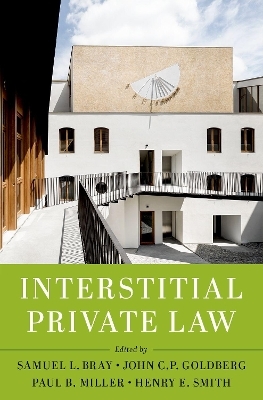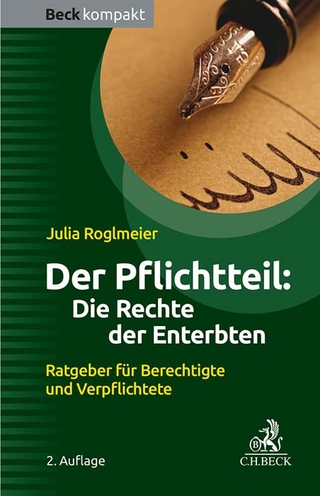
Interstitial Private Law
Oxford University Press Inc (Verlag)
978-0-19-778362-7 (ISBN)
- Lieferbar (Termin unbekannt)
- Versandkostenfrei innerhalb Deutschlands
- Auch auf Rechnung
- Verfügbarkeit in der Filiale vor Ort prüfen
- Artikel merken
Long regarded by US legal scholars as uninteresting, private law theory has received renewed attention in the United States and around the world. Yet, even amid this scholarly revival, private law is still too often reduced to the more traditional concepts found within tort, property, and contract law. These basic categories alone cannot provide sufficient basis for informed doctrinal analysis - lawyers who hope to apply private law theory must also understand the rules and concepts that operate independently of, across, or within the interstices of these fields.
The essays collected in Interstitial Private Law encourage the next generation of private law theorists to engage with the 'connective tissue' of private law. Internationally prominent scholars introduce and analyze these crucially important interstitial aspects, including legal personhood, agency and other attribution rules, consent, estoppel, equity, remedies, and restitution. Contributions explain what interstitial concepts are and explore the ways they operate, contributing to the systematicity and functional coherence of private law systems. In doing so, Interstitial Private Law broadens and deepens the scholarly agenda for private law theory in the United States and worldwide.
Samuel L. Bray is the John N. Matthews Professor of Law at Notre Dame Law School. His primary areas of expertise are remedies, equity, and constitutional law. He was previously a faculty member at UCLA School of Law, as well as a Harrington Faculty Fellow at the University of Texas. He is a McDonald Senior Distinguished Fellow at the Center for the Study of Law and Religion at Emory University, and he serves as an advisor to the Restatement (Third) of Torts: Remedies. John C.P. Goldberg, the Carter Professor of General Jurisprudence at Harvard Law School, is an expert in tort law, tort theory, and political philosophy. He joined the Law School faculty in 2008 and served as a Deputy Dean from 2017 to 2022. Previously, he was a faculty member of Vanderbilt Law School, where he was Associate Dean for Research (2006-08). An Associate Reporter for the American Law Institute's Fourth Restatement of Property, he also serves as an advisor to the Third Restatement of Torts. In addition, he is a member of the editorial boards of the Journal of Tort Law and Legal Theory, and in 2009 was Chair of the Torts and Compensation Systems Section of the Association of American Law Schools. Paul B. Miller is the Robert and Marion Short Professor of Law and Associate Dean for International and Graduate Programs at Notre Dame Law School, where he also serves as Director of the Notre Dame Program on Private Law. Miller taught previously at McGill University in Montréal and has held visiting appointments at Bucerius Law School, the University of Melbourne, Université Paris-Panthéon-Assas, and Tel Aviv University. He has been a member of the Global Faculty of Peking University Law School since 2018. Henry E. Smith is the Fessenden Professor of Law at Harvard Law School, where he directs the Project on the Foundations of Private Law. Previously, Smith taught at the Northwestern University School of Law and was the Fred A. Johnston Professor of Property and Environmental Law at Yale Law School. He has served as the President of the Society for Institutional and Organizational Economics and is the Reporter for the American Law Institute's Fourth Restatement of Property.
| Erscheinungsdatum | 29.09.2024 |
|---|---|
| Verlagsort | New York |
| Sprache | englisch |
| Maße | 157 x 226 mm |
| Gewicht | 567 g |
| Themenwelt | Recht / Steuern ► EU / Internationales Recht |
| Recht / Steuern ► Privatrecht / Bürgerliches Recht ► Besonderes Schuldrecht | |
| ISBN-10 | 0-19-778362-7 / 0197783627 |
| ISBN-13 | 978-0-19-778362-7 / 9780197783627 |
| Zustand | Neuware |
| Informationen gemäß Produktsicherheitsverordnung (GPSR) | |
| Haben Sie eine Frage zum Produkt? |
aus dem Bereich


